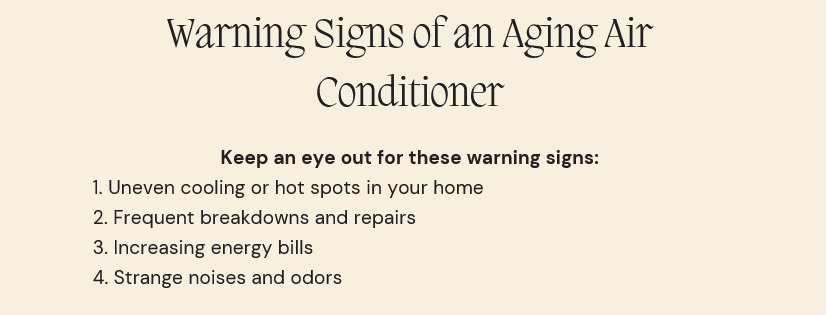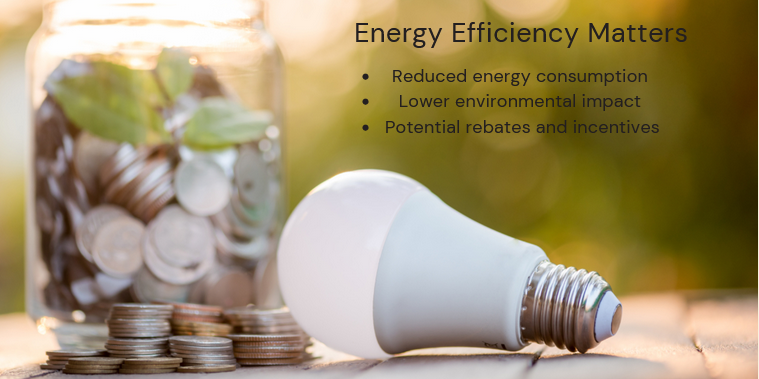It is highly unlikely for an outdated air conditioner to provide a satisfying cooling performance on the hottest summer days. So, it is important to be aware of situations indicating that your Air Conditioner is old enough to be replaced.
Continue reading the following information to explore some basic signs indicating that your air conditioner might be past its prime and ready for retirement. Discovering these signs early can save you from discomfort, high energy bills, and frequent repairs.
The Lifespan of an Air Conditioner
An air conditioner normally lasts between 10-15 years. However, various factors can influence its longevity. For example, regular tune-ups, such as changing filters and scheduling professional inspections, can significantly extend AC lifespan. Additionally, usage patterns and climate conditions play a role. In short, you may consider replacing an air conditioner if it is nearing the 15-year mark or older than 15 years.
Warning Signs of an Aging Air Conditioner
Keep an eye out for these warning signs:
- Uneven cooling or hot spots in your home: If certain areas feel warmer than others or you notice inconsistent cooling, it could indicate a declining performance.
- Frequent breakdowns and repairs: Aging air conditioners require more frequent repairs, and the repair costs can quickly add up. Consider the frequency and cost of repairs concerning the unit’s age.
- Increasing energy bills: As air conditioners age, they lose efficiency, consuming more energy and raising energy costs.
- Strange noises and odors: Unusual sounds like rattling, grinding, or banging, as well as musty or burning odors, may indicate mechanical issues within the system.
Although the experts of AC Repair Miami FL can resolve these issues at affordable prices, you should consider replacing your air conditioner if the problem persists again and again.
Energy Efficiency Matters
Energy efficiency is crucial when evaluating your air conditioner’s performance. Look for units with a high Seasonal Energy Efficiency Ratio (SEER) rating. Upgrading to an energy-efficient air conditioner can yield significant benefits:
- Reduced energy consumption: Newer models are designed to consume less energy, resulting in lower utility bills.
- Lower environmental impact: Energy-efficient units help reduce greenhouse gas emissions and promote sustainability.
- Potential rebates and incentives: Check with local energy companies or government programs for potential rebates or incentives available for purchasing energy-efficient air conditioners.
Benefits of Replacing Your Air Conditioner
Replacing your old air conditioner can bring several advantages:
- Improved comfort and indoor air quality: New models offer enhanced cooling performance and better humidity control, creating a more comfortable living environment. They also provide improved air filtration, reducing allergens and pollutants.
- Reduced energy consumption and lower utility bills: Energy-efficient air conditioners consume less electricity, resulting in substantial cost savings over time.
- Decreased likelihood of breakdowns and costly repairs: You’ll experience fewer breakdowns and expensive repairs, eventually providing peace of mind during the hot summer months.
- Increased property value and attractiveness to potential buyers: Upgrading to a modern, efficient air conditioner enhances your home’s value and makes it more appealing.
Choosing the Right Replacement
Consider the following factors when buying a new AC:
- Sizing: Choosing the right size of an air conditioner as per the size of your home is crucial to maximize cooling efficiency and avoid overworking the system.
- Brand and model research: Look for reputable brands and models known for their reliability, energy efficiency, and positive customer reviews.
- Consult HVAC professionals: They can help you assess your specific needs and recommend a perfect air conditioner for your home. Moreover, they can provide valuable insights and ensure proper installation for optimal performance.
Consider additional features that can enhance your air conditioning experience. Programmable thermostats allow you to set temperature schedules and save energy when you’re away. Smart technology integration enables remote control and monitoring through smartphone apps, giving you convenience and control at your fingertips.
Summarizing the Post
In conclusion, don’t overlook the signs indicating your air conditioner is reaching the end of its lifespan. You can avoid discomfort, high energy bills, and frequent repairs by recognizing these signs early on. Upgrading to a new, energy-efficient air conditioner brings improved comfort, reduced energy consumption, and fewer breakdowns.
Take action before the summer heat arrives. Assess your air conditioner for the warning signs discussed, consult with professionals of AC Repair Miami FL, and explore the benefits of replacing your old unit. Investing in a new air conditioner ensures comfort and contributes to energy savings and a greener environment. So, don’t let an outdated air conditioner leave you sweating this summer.
Upgrade to a new, reliable model and enjoy the cool comfort you deserve. Remember, the professionals at AC Repair Miami FL are here to assist you. Contact us today for expert advice and reliable air conditioning solutions.


